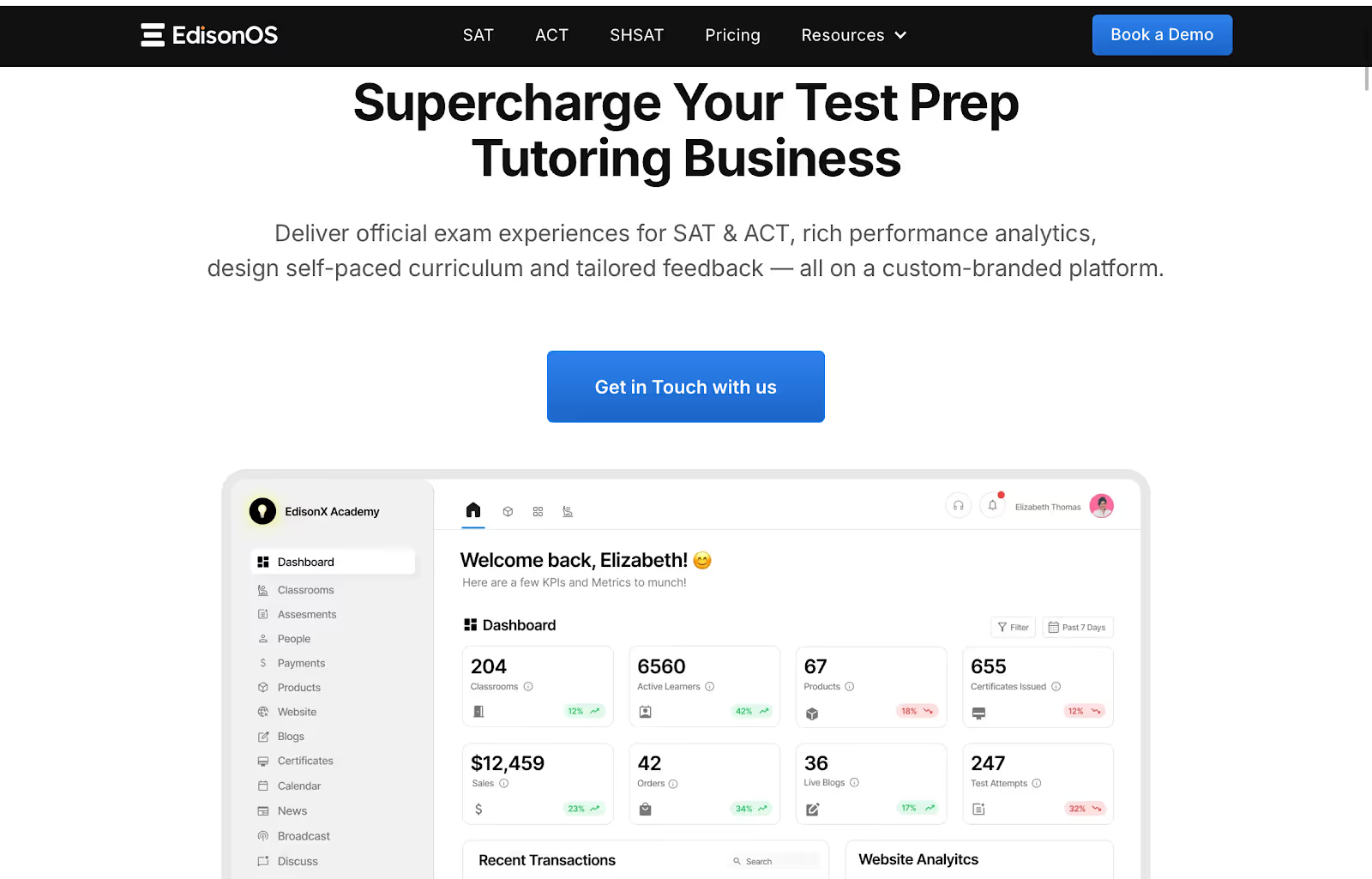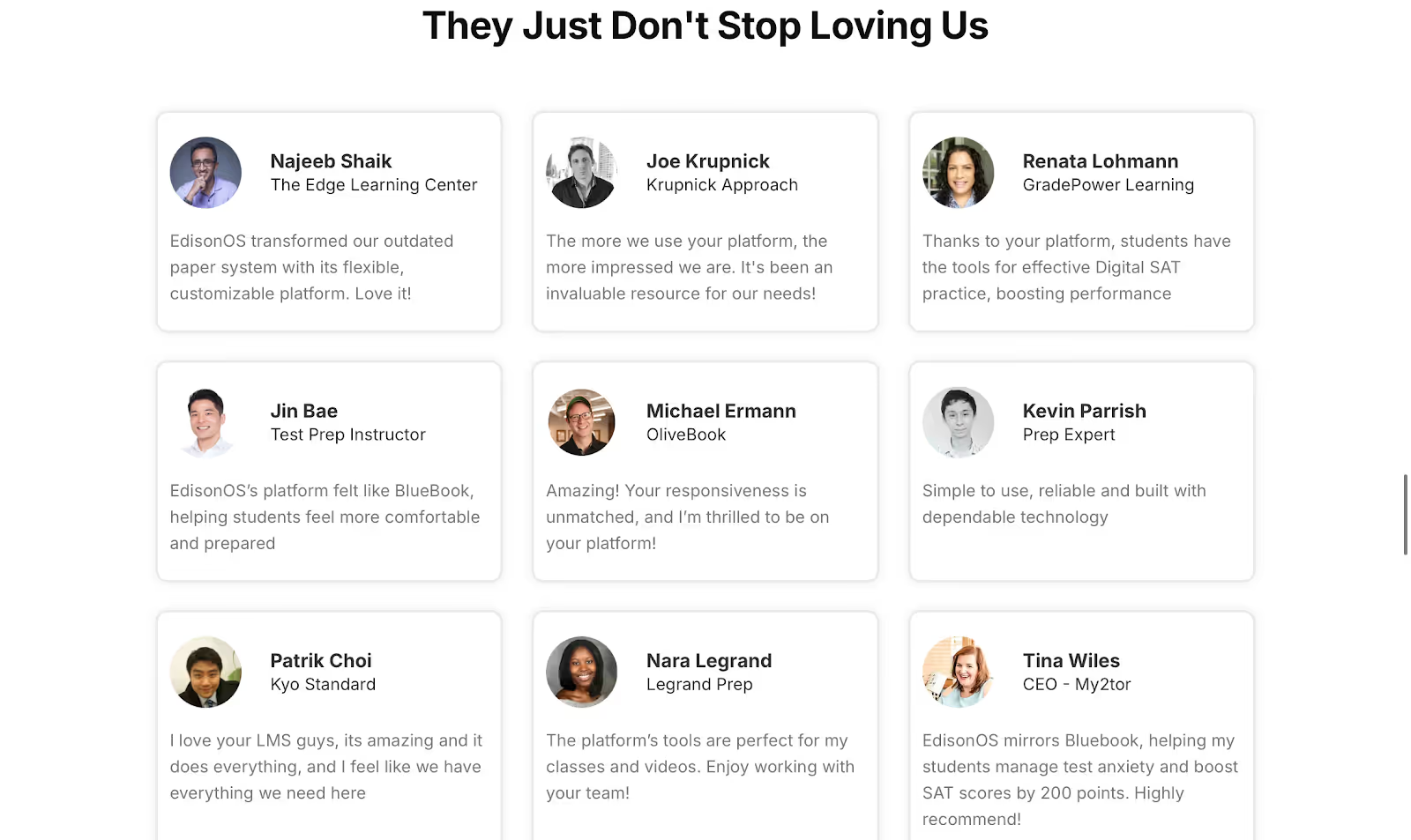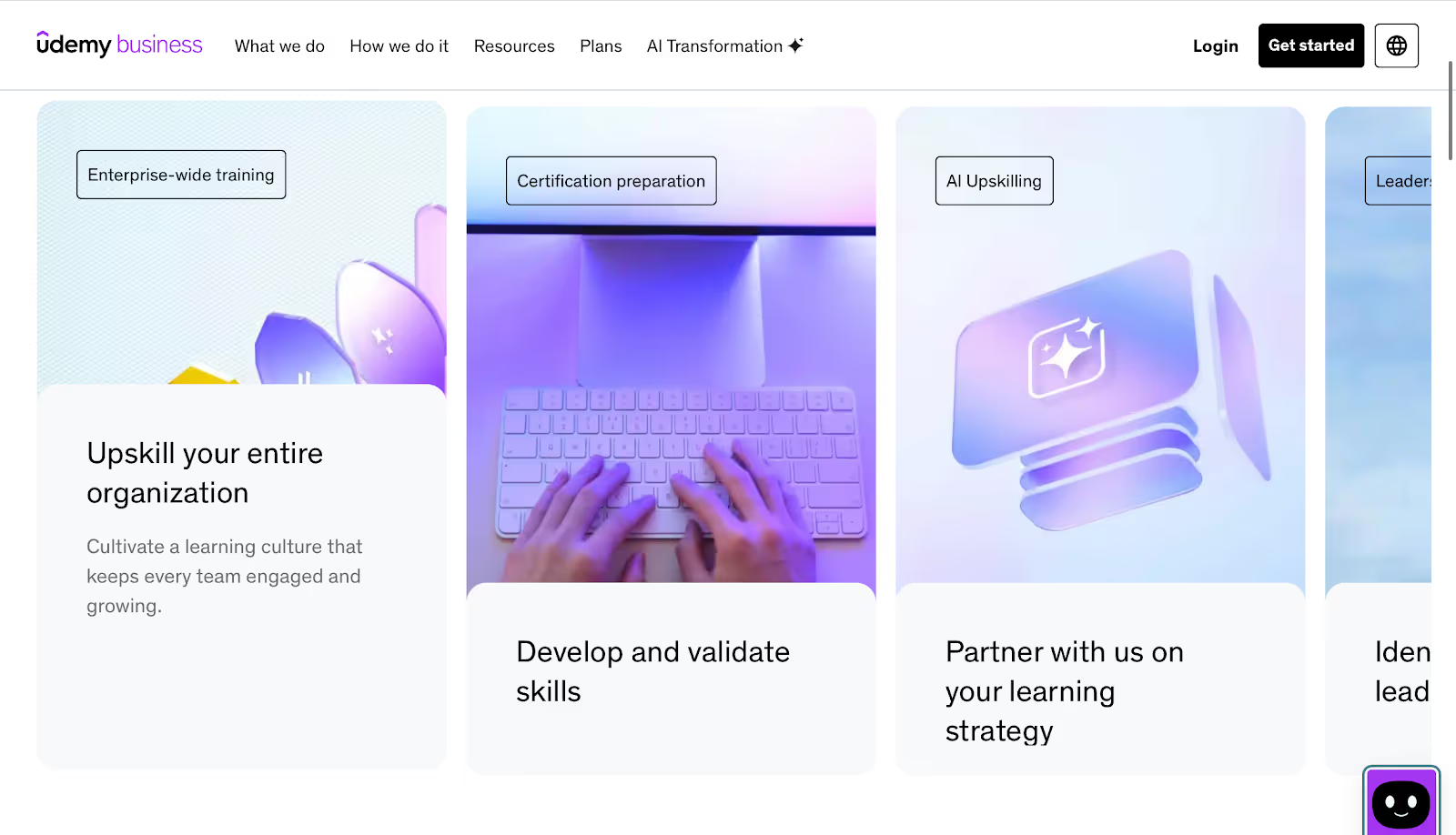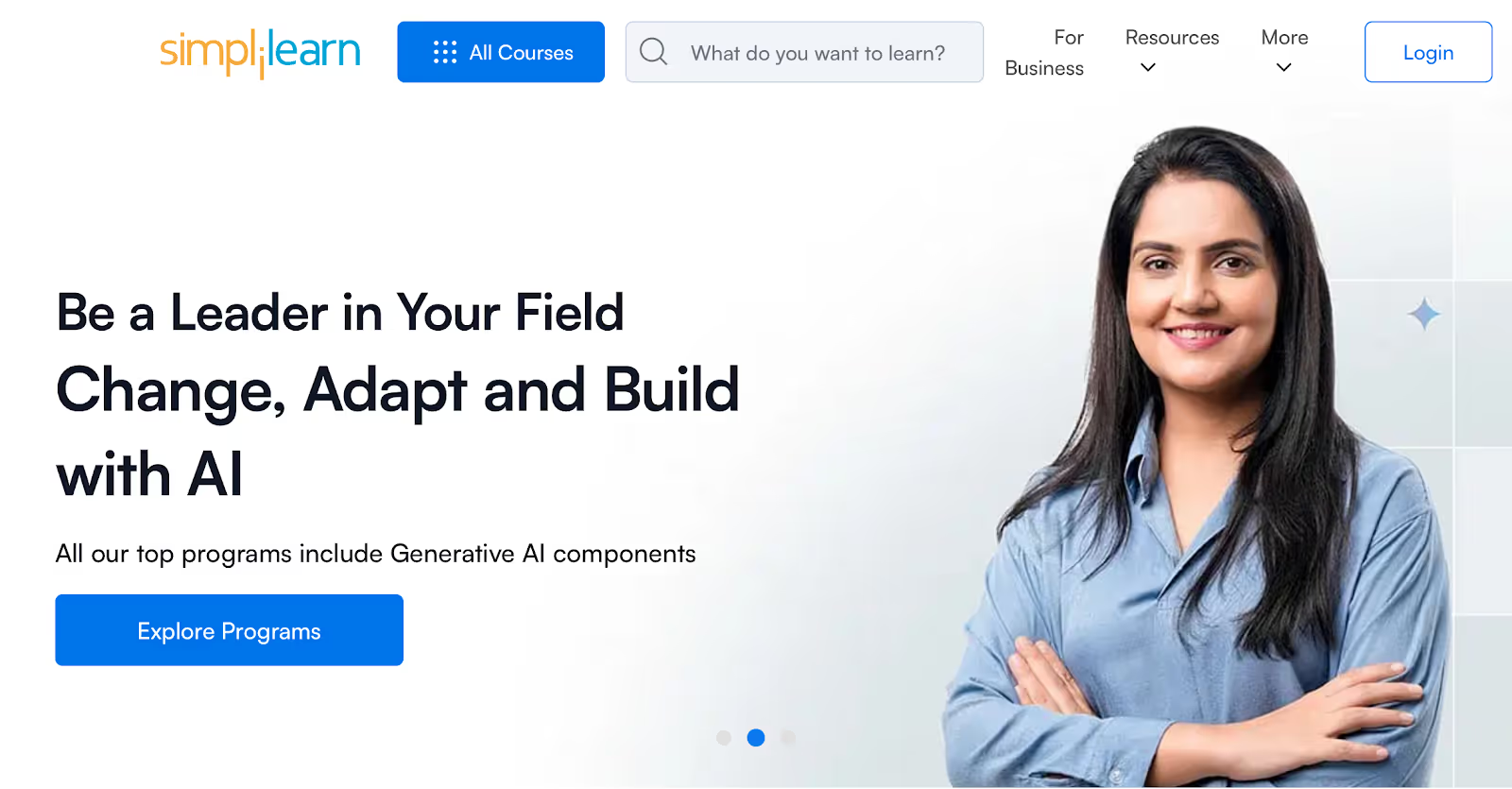




Key Takeaways
- Discover 7 powerful R.test AI alternatives tailored for modern tutors and educators.
- Learn which platforms support personalized, project-based, and test-ready learning experiences.
- Find tools that go beyond scores to build skills, track progress, and engage students deeply.
R.test AI has gained attention for its AI-driven approach to standardized test preparation, particularly for exams like the Digital SAT and ACT. Its adaptive assessments and personalized feedback mechanisms have made it a popular choice among students aiming to improve their test scores.
Those seeking R.test AI alternatives want features that help with student performance tracking, question bank management, home work and study plan management, etc. This shift is driven by the need for tools that not only improve a student’s performance but also help identify and outshine their weaknesses.
In this article, we'll explore seven notable R.test AI competitors, examining their features, benefits, and how they cater to the diverse needs of tutors and educators. Our goal is to provide a neutral comparison to help you make an informed decision that aligns with your educational objectives.
Why Look for an Alternative to R.test AI?
- Limited Depth in Learning
R.test AI is strong in test simulations but lacks tools for deep learning. It doesn’t offer personalized instruction, adaptive content, or mentorship.
- Rigid Teaching Framework
Educators may find it restrictive. The platform doesn’t support diverse teaching styles or flexible curricula.
- No Project-Based Learning
There’s no support for hands-on activities or real-world applications- key elements in AI education today.
- Missing Soft Skill Development
The focus is purely academic. Skills like collaboration, communication, or critical thinking are not addressed.
- Overemphasis on Test Scores
Its main metric is test performance. It overlooks student engagement, comprehension, and holistic growth.
- Lacks Collaboration Tools
There are no options for real-time discussions, peer feedback, or interactive learning experiences.
- Better Alternatives for Tutors
If you aim to teach beyond tests, platforms like EdisonOS provide stronger tools for holistic, future-ready education.
Top 7 Alternatives to R.test AI
1. EdisonOS

EdisonOS is an AI education platform designed to provide comprehensive learning experiences through personalized learning paths, practical applications, and instructor interactions. It combines interactive tools, real-world projects, and a tutor-first approach to help learners succeed.
Key Features:
- Own Assessment Creation (BYOT): Tutors can create their own tests either using our 5000+ question library in 15 mins or with a question collection they have gathered over the years in their experience.
- Bulk Upload: Tutors can upload a collection of questions in one go. They can create a bunch of questions in the set format defined by EdisonOS in an Excel file and then hit upload to a question library.
- AI Question Extraction (beta): Tutors can give a PDF or image input to the platform, and using AI, we will extract the questions, answers, options, reasons, what type of questions they are, what type of test it is, and replicate them as an assessment or in a folder under the question library.
- Tutor Mode: Students can enable the Tutor Mode to get the correct answer is and the reasoning behind it. Now, instead of discussing wrong answers and explanations in a separate students can get them in real-time.
- Offline Mode: Tutors can conduct offline tests by downloading the test in PDF format, and there will also be a bubble sheet (OMR) available in the interface. They can input the answers into the bubble sheet, and the platform will evaluate the inputs and give them their scaled score
- Public Assessments: Tutors can make any assessment publicly available. They just need to copy the public link and distribute it in any forum they want.
- Digital Interface: EdisonOS supports any standardized test and state test digital interface. We can mimic each and every test screen by screen, button by button, and give the tutors and their students that immersive, real-time experience as though they are taking the official test. It includes not only the look and feel of the test but also the tools provided on the test like Desmos/basic calculator, highlighter, zoom tool, flagging questions, interactive images, charts, graphs, tables, timer, break session, move through sections, proctoring, underline tool, and line reader tool.
- Practice Question Formats: Tutors can create and assign practice tests to students. They can choose from different question formats (table, fill in the blanks, drag and drop)that they want to practice on. Students will be trained in the exact question formats that will be used in the official test.
- Live Sessions: Tutors can conduct live sessions to rectify their wrong answers, understanding why they made them, strategizing for lessons and tests, and giving feedback on their progress over the week. This happens either offline, online, or often in a hybrid mode.
- Reporting: EdisonOS provides a detailed report of the scaled score, section analysis, skill analysis, time analysis, question analysis, session logs, and many more data points. Tutors can adjust the weightages of conversion for each test so they can make a student take an easy test or a hard test and analyze their performance accordingly. Results can also be sent to parents/guardians by simply entering their email IDs—the platform will automatically send the reports, keeping parents informed about their child’s progress.
- Question Analytics: Tutors can show students the correct answers, their incorrect answers, the time taken per question, how many of their peers got the answer right, and the difficulty percentage of each question based on data from other students’ attempts.
Pros:
- Holistic approach to AI education
- Emphasis on practical skills and real-world applications
- Supportive learning environment with instructor access
Cons:
- May require a time commitment for project completion
Review:
“The more we use your platform, the more impressed we are. It's been an invaluable resource for our needs!”
~ Joe Krupnick, Krupnick Approach

2. Coursera
Coursera is one of the most widely used global platforms for online learning, offering courses, professional certificates, and degrees from top universities and institutions. It’s heavily content-driven and geared toward learners looking for self-paced academic or career-focused learning. For tutors, Coursera doesn’t offer the flexibility to create and brand your own educational content or manage cohorts, making it more of a learner-first platform than one that supports educator-led ecosystems.
Key Features:
- Courses accessible from institutions like Stanford and DeepLearning AI
- Flexible learning schedules with self-paced options
- Certificates upon course completion

Pros:
- High-quality content from reputable sources
- Wide range of topics and specializations
Cons:
- Some courses can be expensive
- Quality may vary from course to course
Review
“I like the flexibility and the large number of courses available, that it can be used anywhere and through any device. However the cost per license for a small business can be high.”
~ Joannie Estefany L., Human Resources Manager
3. Udemy
Udemy is a massive open marketplace where instructors can publish video-based courses on almost any topic. It’s ideal for independent creators who want to monetize pre-recorded lessons and reach a wide audience. However, its structure is geared more toward asynchronous, one-off learning rather than sustained mentorship, live engagement, or long-term student progress tracking. Tutors may find it useful for visibility, but not as a full-fledged teaching system.
Key Features:
- Extensive course library with diverse topics
- Lifetime access to purchased courses
- Affordable pricing with frequent discounts

Pros:
- Wide variety of courses and teaching styles
- Self-paced learning suitable for different schedules
Cons:
- Variable course quality due to open marketplace model
- Less structured learning paths
Review
“It offers AI based learning that is quite helpful in enhancing user skills. It offers an affordable, easy to use and reliable team training model. But the interface is somewhat complex and not that user-friendly. Anyone can create a course on Udemy without verification.”
~ Ankit D., Digital Marketing Specialist
4. Pluralsight
Pluralsight is a tech-skills-focused platform, especially popular among developers, IT professionals, and teams looking for upskilling in fields like cloud computing, AI, machine learning, and cybersecurity. It’s content-rich, with structured learning paths and skill assessments, but not customizable for external educators. Tutors looking to create personalized AI or digital SAT programs might find it restrictive for curriculum design or student interaction.
Key Features:
- Curated learning paths for specific roles and technologies
- Skill assessments to measure proficiency
- Expert-led video courses

Pros:
- In-depth technical content
- Structured learning paths for career progression
Cons:
- Subscription-based model can be costly
- May be overwhelming for beginners
Review
“The depth of content allows learners to go from beginner to advanced levels in a structured way. Its format and depth are geared toward serious learners and professionals, so those looking for more relaxed or interactive learning (e.g., gamified experiences) may prefer other platforms.”
~ Anonymous, Computer Software
5. DataCamp
DataCamp is tailored specifically for learning data science, analytics, and AI, using interactive coding environments. It’s a favorite among beginners in Python, R, SQL, and other data-focused tools. However, like Pluralsight, it’s more of a pre-packaged learning environment than a platform built for tutors. There’s no way to create your own curriculum or engage directly with students, limiting its value for those running customized educational programs.
Key Features:
- Interactive coding exercises and projects
- Career tracks focused on data science and AI roles
- Gamified learning experience

Pros:
- Hands-on, practical learning approach
- Beginner-friendly with immediate feedback
Cons:
- Limited to data science and AI topics
- Requires a subscription
Review
“Datacamp offers a live environment to practice skills. This live environment offers hints for users still needing more help. Sometimes while in the live environment the system refreshes as you are trying to work. Sometimes while in the live environment the system refreshes as you are trying to work.”
~ Kristin G., Logistics Business Analyst
6. Simplilearn
Simplilearn offers professional certification programs in digital skills such as data science, project management, and cybersecurity. Many of its courses are conducted in partnership with global universities and are designed for working professionals. While it does incorporate live classes, it’s more enterprise-oriented and doesn’t cater to independent educators or smaller tutoring businesses that want full control over their teaching workflows and branding.
Key Features:
- Blended learning approach with self-paced and live virtual classes
- Industry-relevant capstone projects
- Career assistance and job placement support

Pros:
- Focus on industry-recognized certifications
- Live instructor-led sessions for direct interaction
Cons:
- Generally more expensive than typical online courses
- Time commitment required for live sessions
Review
“Simplilearn can be accessed by anyone and doesn't require much help, a new learner can easily learn and understand and upskill themselves for future Endevaours”
~ Parth S., Assistant Manager Sales Operations
7. edX
edX, founded by MIT and Harvard, provides access to university-level courses across a wide range of subjects, including computer science, AI, and humanities. Its credibility and academic rigor are unmatched, and it offers both individual courses and full programs like MicroMasters and degrees. However, like Coursera, it operates within a closed content model, where tutors cannot build or customize their own learning environments. This makes it more useful for learners than for educators who want to teach, engage, and scale independently.
Key Features:
- University-level instruction with opportunities to audit or earn verified certificates
- MicroMasters programs in AI, machine learning, and data science
- Courses from top-tier institutions like MIT, Harvard, and Columbia
- Support for Digital SAT and Digital ACT-related skills via specialized prep tracks

Pros:
- High academic standards and structured curriculums
- Flexibility to learn at your own pace or follow instructor timelines
- Recognized by employers and academic institutions alike
Cons:
- Some courses may lack interactivity or practical application
- Verified certificates can be expensive
Review
“Vast variety of courses available in all the fields from multiple top notch universities, but courses are high priced when picked from a listed good university.”
~ Sachin J., Associate Consultant
Why Choose EdisonOS as the R.test AI Alternative
While R.test AI focuses on test diagnostics, EdisonOS delivers a broader and more engaging learning experience. It offers personalized learning paths that adapt to each student’s pace and level. Hands-on projects let learners apply their knowledge instead of just memorizing answers. This makes learning more meaningful and skill-based.
With EdisonOS, tutors can interact directly with learners. This ensures that students get the support they need, especially when dealing with complex topics like artificial intelligence. The platform goes beyond standard test prep to foster deep understanding. It also helps students prepare effectively for the digital SAT and digital ACT, making it a complete toolkit for modern education.
EdisonOS stands out by offering:
- Real-world project integration: Learners can apply what they study through practical, hands-on projects
- Tutor-first course design: Educators can craft personalized learning journeys for every student
- Collaborative learning tools: Includes real-time feedback, peer interaction, and performance tracking
- Comprehensive curriculum: Goes beyond assessments to cover AI foundations, ethics, and machine learning
- Support for test readiness: Built-in access to free digital SAT and free digital ACT practice tests
The Bottom Line
Finding the right platform for your educational needs depends on more than just assessments. While R.test AI offers reliable tools for test diagnostics, it lacks the flexibility, depth, and interactivity that modern tutoring demands. For educators focused on fostering critical thinking, hands-on learning, and personalized growth, choosing a platform that goes beyond test prep is essential.
EdisonOS provides that much-needed balance. With its comprehensive curriculum, real-world project integration, and tutor-first design, it empowers educators to create impactful, adaptive learning journeys. Whether you're preparing students for the digital SAT, the digital ACT, or helping them explore AI fundamentals, EdisonOS offers the structure and support to help your learners succeed- both inside and beyond the exam room.
For tutors seeking a smarter, more holistic alternative to R.test AI, EdisonOS is the upgrade your teaching deserves.
FAQs
1. Why is project-based learning important in test prep or AI education?
Project-based learning helps students apply theoretical knowledge in real scenarios. This is especially crucial in fields like AI where practical understanding and critical thinking are essential. For test prep, it enhances comprehension and retention rather than encouraging rote learning.
2. What are some challenges tutors face with rigid test prep platforms?
Tutors often struggle with lack of customization, limited content types (like only multiple-choice), and no real-time student engagement tools. These limitations can affect teaching flexibility, student motivation, and outcomes.
3. How do digital SAT and digital ACT formats change learning needs?
Digital formats often involve adaptive questioning, on-screen tools, and time tracking, which require different preparation methods than traditional paper tests. Educators now need platforms that reflect these changes, offer updated practice tools, and accommodate digital learning styles.
4. What should I look for in an alternative to R.test AI?
Look for platforms that offer a mix of test preparation, interactive learning, curriculum flexibility, and analytics. Bonus if it supports integration of soft skills, personalized pathways, and collaboration tools- all of which contribute to deeper student engagement and better outcomes.
Tutors Edge by EdisonOS
in our newsletter, curated to help tutors stay ahead!
Tutors Edge by EdisonOS
Get Exclusive test insights and updates in our newsletter, curated to help tutors stay ahead!
Recommended Reads
Recommended Podcasts







.avif)



.png)
.webp)
